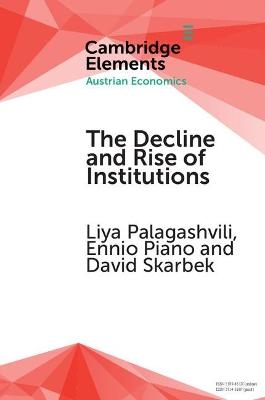
The Decline and Rise of Institutions
A Modern Survey of the Austrian Contribution to the Economic Analysis of Institutions
Seiten
2017
Cambridge University Press (Verlag)
978-1-316-64917-6 (ISBN)
Cambridge University Press (Verlag)
978-1-316-64917-6 (ISBN)
Institutions are the 'rules of the game' that facilitate economic, social, and political interactions. They include legal rules, property rights, constitutions, political structures, and norms and customs. The Austrian economics framework provides an understanding for which institutions matter for growth, how they matter, and how they emerge and change.
Institutions are the formal or informal 'rules of the game' that facilitate economic, social, and political interactions. These include such things as legal rules, property rights, constitutions, political structures, and norms and customs. The main theoretical insights from Austrian economics regarding private property rights and prices, entrepreneurship, and spontaneous order mechanisms play a key role in advancing institutional economics. The Austrian economics framework provides an understanding for which institutions matter for growth, how they matter, and how they emerge and can change over time. Specifically, Austrians have contributed significantly to the areas of institutional stickiness and informal institutions, self-governance and self-enforcing contracts, institutional entrepreneurship, and the political infrastructure for development.
Institutions are the formal or informal 'rules of the game' that facilitate economic, social, and political interactions. These include such things as legal rules, property rights, constitutions, political structures, and norms and customs. The main theoretical insights from Austrian economics regarding private property rights and prices, entrepreneurship, and spontaneous order mechanisms play a key role in advancing institutional economics. The Austrian economics framework provides an understanding for which institutions matter for growth, how they matter, and how they emerge and can change over time. Specifically, Austrians have contributed significantly to the areas of institutional stickiness and informal institutions, self-governance and self-enforcing contracts, institutional entrepreneurship, and the political infrastructure for development.
Liya Palagashvili is an Assistant Professor of Economics at State University of New York, Purchase. Ennio Piano is a Ph.D. student in the Department of Economics at George Mason University, Virginia. David Skarbek is a Senior Lecturer in Political Economy in the Department of Political Economy at King's College London.
| Erscheinungsdatum | 08.09.2017 |
|---|---|
| Reihe/Serie | Elements in Austrian Economics |
| Zusatzinfo | Worked examples or Exercises |
| Verlagsort | Cambridge |
| Sprache | englisch |
| Maße | 153 x 230 mm |
| Gewicht | 100 g |
| Themenwelt | Wirtschaft ► Allgemeines / Lexika |
| Wirtschaft ► Volkswirtschaftslehre ► Makroökonomie | |
| Wirtschaft ► Volkswirtschaftslehre ► Ökonometrie | |
| ISBN-10 | 1-316-64917-2 / 1316649172 |
| ISBN-13 | 978-1-316-64917-6 / 9781316649176 |
| Zustand | Neuware |
| Informationen gemäß Produktsicherheitsverordnung (GPSR) | |
| Haben Sie eine Frage zum Produkt? |
Mehr entdecken
aus dem Bereich
aus dem Bereich
Makroökonomie, Wirtschaftspolitik und nachhaltige Entwicklung
Buch | Hardcover (2022)
Vahlen (Verlag)
CHF 69,70
Volkswirtschaftslehre für eine sich ändernde Welt
Buch | Hardcover (2024)
De Gruyter Oldenbourg (Verlag)
CHF 62,90
Kompakt und prüfungsrelevant für Wirtschaftswissenschaftler
Buch | Softcover (2021)
Vahlen, Franz (Verlag)
CHF 16,65


